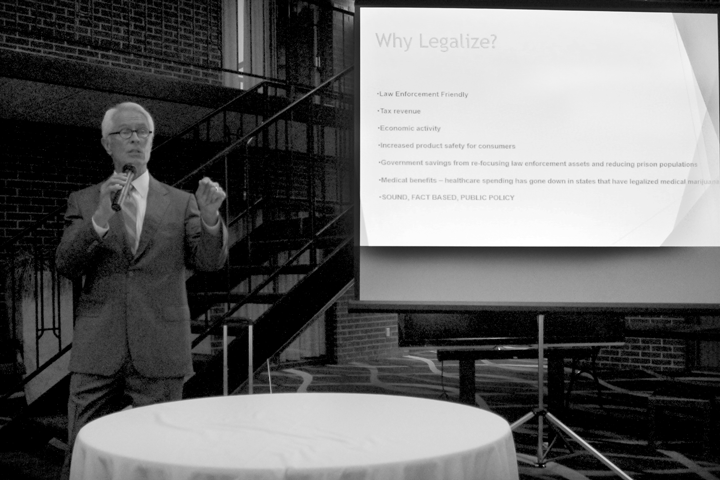Editor’s note: This is the first of two stories about information presented Monday at a public forum titled “Grow the Economy — Should Kansas Legalize?”
Barry Grissom, former U.S. Attorney for the State of Kansas from 2010-2016, doesn’t use cannabis products, he told the group at the cannabis forum at the Best Western Angus Inn Courtyard Monday night. The program was sponsored by Great Bend businesswoman Jan Morton, owner of Essential Elements. He also doesn’t smoke tobacco, nor does he drink bourbon or scotch whiskey.
“But as a responsible adult, if I did any of those things, I shouldn’t lose my liberty, and I shouldn’t have my property taken away from me.”
Grissom is in favor of having cannabis legalized in the United States.
Currently, cannabis is federally listed as a Schedule 1 narcotic, right alongside hallucinogenic drugs like heroin and LSD.
Some cultivars, such as marijuana, produce the chemical compound THC, which provides a mild, hallucinogenic effect. Other cultivars, like hemp, do not contain THC, but produce the non-hallucinogenic compound CBD. There are proponents of both compounds that swear that they have multiple positive outcomes for human health. There are also a host of other useful products that can be produced from various parts of the plants.
Striving to change law
When Grissom left the Department of Justice, he said, he took a somewhat unique perspective as a former federal prosecutor, whose office put people in jail for violating the law.
“It’s not a fair law,” he said. “It’s not a law that I think contributes to society. Our laws should be something that builds us to be a better society. This law doesn’t.”
He claims to be very pro-law enforcement. In law enforcement, he said, there is a very limited amount of resources available to keep people safe. Where to use the taxpayers’ money is an important consideration. It is his opinion that using it for investigating, interdiction, arresting, prosecuting and incarcerating someone for doing something as a responsible adult is a waste of resources. But, he adds, he believes in following the law, and that is why he is working to change it through his work with organizations like NRML and the Drug Policy Alliance and others.
“I feel passionately it is something that needs to change,” he said. It’s his opinion that it’s now a matter of when, not if, it will happen, and when it does, Kansans involved in agriculture stand to benefit.
“It’s going to be a real green wave,” Grissom said. “It’s a real opportunity for our friends in agriculture to really get ahead of the curve. People are going to do really well with this.”


Support growing
Support for legalizing cannabis is well above 50 percent in both red and blue states, amongst men and women, and in all but the oldest age groups. The States Act is a bill currently being debated, which has supporters on each side of the aisle backing it, Grissom said. It will move public policy and legislation, and it will allow marijuana from being removed as a Schedule 1 drug and will allow each state to decide if it will allow for use.
Thirty states, including Colorado, have legalized it in some way. Missouri has a referendum on the ballot for November to allow medical marijuana, and Oklahoma just passed its referendum for the same. Nebraska, he said, is seriously considering it. Kansas, therefore, could find itself landlocked. Revenue is driving the movement all around this state.
He pointed to Colorado’s $1.5 billion cannabis sales in the state in 2013. That’s money that didn’t go to illegal operations. It went to entrepreneurs who created 20,000 new full-time jobs paying living wages. And the state picked up an extra $250 million in tax revenue, he added.
“That’s a win, win, win across the board from my perspective,” he said.
He noted that those lobbying hardest to stop legalization are not law enforcement, but the pharmaceutical industry and the private prison industry.
Farm bill may be key
“Industrial hemp is in legislation in the Farm Bill that just came out of the Senate,” Grissom said. He spoke of a provision included in the Senate’s version of The Agriculture Improvement Act of 2018 (Farm Bill) that would legalize the production of industrial hemp. The act is now in conference committee, as the House and Senate continue their efforts to compromise. At this time, hemp is not a make-or-break issue. It is expected they will have a bill ready for the president to sign by the Sept. 30 deadline.
He urged voters to press elected officials about where they stand on issues related to cannabis.
“Responsibility of making sure they don’t skate around the issue is up to you folks to ask those questions and hold their feet to the fire,” Grissom said. “It’s a powerful tool, and I hope you use it.”
Also speaking at the event were John Bolsenga and Eduardo Provencia. Bolsenga, from Fairplay, Colo., is a consultant and cannabis agriculturist and owner of Elevated Hemp, a company that consults with small and medium cannabis growers. Provencia is an attorney for cannabis entrepreneur Lynn Honderd, founder of Mary’s Medicinals, Mary’s Nutritionals, and Mary’s Pet Products. He talked about how there may be more untapped opportunity in the hemp and specifically the CBD market in years to come since the products appeal more to older generations.
Gubernatorial candidates were also invited to the forum, and Libertarian candidate Jeff Caldwell was on hand to speak about the topic.





